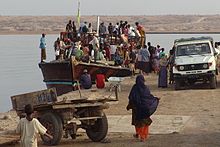Obock
|
أوبوك Obock |
||
|---|---|---|
|
|
||
| Coordinates | 11 ° 58 ′ N , 43 ° 17 ′ E | |
| Basic data | ||
| Country | Djibouti | |
| Obock | ||
| ISO 3166-2 | DJ OB | |
| height | 12 m | |
| Residents | 7600 | |
| founding | 1862 | |
Obock (also written Obok or Ubuk , Arabic أوبوك Awbūk , DMG Aubūk ) is a small port town on the Gulf of Tadjoura in northern Djibouti and the capital of the Obock region . It has an estimated 7600 inhabitants.
The original name of the place reads from Afar Ḥáyyu or Ḥayyú ("full") and refers to the formerly existing mangroves, which ensured the survival of the camels in times of drought. In 1862, France acquired Obock from local Afar sultans in order to build a coaling station for ships in the town. This marked the beginning of the colonization of what is now Djibouti.
The French adopted the name oboe used by Arab seafarers , which is derived from 'As Ōbóki , a name for the middle section of the Oued Dár'i. Obock was initially the capital of the Territoire d'Obock , but since the water supply in this place was difficult, the colonial administration made Djibouti City its new center in 1892 .
Obock is known among philatelists for the postage stamps that were issued during the Territoire d'Obock era .
The place has an airfield and ferry connections to Djibouti City. However, it remains isolated from the rest of Djibouti. The center of Obock was damaged in the civil war in the early 1990s .
swell
- Daoud Aboubaker Alwan, Yohanis Mibrathu: Obock , in: Historical Dictionary of Djibouti , Scarecrow Press 2000, ISBN 978-0810838734
- Didier Morin: Ḥáyyu , in: Dictionnaire historique afar (1288-1982) , Karthala Editions 2004, ISBN 9782845864924 (pp. 191f.)

